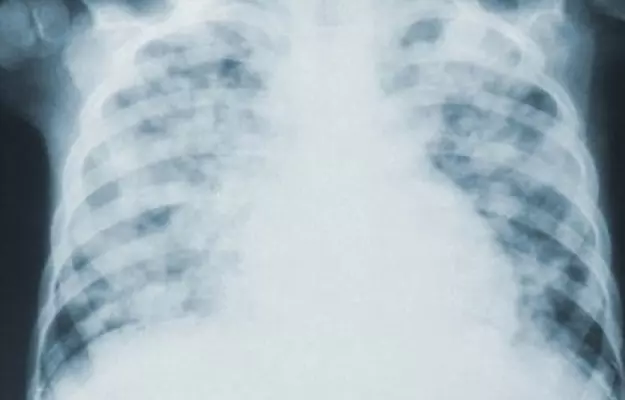As of 14 April 2020, more than 19.2 lakh people have been diagnosed with COVID-19 globally and over 1.24 lakh people have died of the new coronavirus infection.
Research shows that about 20% of patients develop moderate to severe symptoms of COVID-19, and may need hospitalisation. Around 5% of these need may need intensive care for COVID-19 and mechanical ventilator support for COVID-19.
If we extrapolate from this data - 20% of 19.2 lakh patients - around 3.84 lakh people globally are suspected to have severe symptoms of COVID-19, which may include hypoxia (low availability of oxygen in the body) and pneumonia.
The World Health Organization had initially named this infectious disease novel coronavirus-infected pneumonia. Later WHO changed it to SARS-CoV-2 infection or COVID-19. Doctors have been trying to find out ways to know more about this disease so that they are able to cure the severe symptoms of this disease.
Here in this article, we will tell you about pneumonia-related to COVID-19 infection.
- What is a novel coronavirus-infected pneumonia?
- What are the symptoms of pneumonia associated with COVID-19?
- Why do some COVID-19 patients develop pneumonia symptoms?
- Who is likely to develop pneumonia associated with COVID-19?
- How is pneumonia associated with COVID-19 diagnosed?
- How is pneumonia associated with COVID-19 treated?
What is a novel coronavirus-infected pneumonia?
Pneumonia is an infection which may affect either one or both the lungs in the human body. It can be caused due to bacteria, viruses or fungi. It is a serious infection in which the air sacs get filled either with pus or with other liquid.
Pneumonia is one of the serious complications of the COVID-19 infection. It can either affect one lobe or different sections of the lungs. (Our lungs have five lobes or sections: three on the right lung and two on the left.)
What are the symptoms of pneumonia associated with COVID-19?
The symptoms of novel coronavirus-infected pneumonia are:
- Fever
- Fatigue
- Dry cough
- Headache
- Sharp or stabbing chest pain
- Shortness of breath (dyspnea)
- Weakness
The less common symptoms of COVID-19 related pneumonia are:
- Runny nose (rhinorrhea)
- Sore throat
- Diarrhoea
Why do some COVID-19 patients develop pneumonia symptoms?
The new coronavirus, SARS-CoV-2, can enter the body through the mucous membranes of the nose, eyes and mouth.
When this happens, the body tries to expel the virus. This happens through a natural process in which tiny hair-like projection in the nose and windpipe called cilia try to push the virus out - through a sneeze or a cough. Mucous produced by the membranes also tries to destroy the virus by consuming it.
If - despite these efforts - the virus enters the lungs, the body's immune system steps things up. As the body fights the viral infection, though, it can lead to inflammation in the tiny air sacs in the lungs called the alveoli.
Now, as a result of the inflammation, the alveoli fill up with fluid - this is what causes the pneumonia-like symptoms and hypoxemia (lack of adequate oxygen in the blood) in COVID-19.
COVID-19 patients can - if they become severely ill - develop one of two different types of pneumonia:
- Lobar pneumonia: Affects the lobes of the lungs.
- Bronchopneumonia: Affects the airways of bronchi of the lungs.
Who is likely to develop pneumonia associated with COVID-19?
While there is no definitive research on this yet, we know that people over 60 years of age and those with the following comorbidities (underlying diseases) are more likely to develop severe symptoms of COVID-19 (like pneumonia) if they contract the infection:
- High blood pressure (hypertension)
- Diabetes
- Heart disease
- Chronic kidney disease
- Lung disease
- Cancer
Read more: COVID-19 prevention tips for older people and those living with chronic illnesses
How is pneumonia associated with COVID-19 diagnosed?
Pneumonia associated with COVID-19 can be diagnosed with the help of the following tests:
- X-rays: X-rays are the first line of imaging done to determine pneumonia in a person. Chest X-rays would be clear in mild cases but will show airspace opacities in case of severe disease.
- CT scan: Chest CT scan would show the symptoms of developing or developed pneumonia.
- Ultrasound: Ultrasound of the lungs may also be done to find out the symptoms of COVID-19 related pneumonia.
- Bronchoscopy: In some critical cases, doctors may also inspect the lungs with the help of a flexible tool called a bronchoscope.
How is pneumonia associated with COVID-19 treated?
The treatment of pneumonia is done with a multi-directional approach, which involves the following:
- Antiviral medications for the treatment of the underlying viral disease. Since a focused treatment for COVID-19 isn't available yet, various other drugs are being tried and tested to kill the SARS-CoV-2 virus.
- Fluid intake is increased by injecting IV fluids.
- Oxygen therapy to relieve the issue of breathlessness. Some of the patients may also require ventilator support for breathing.
- Antipyretics are given to relieve the fever.
- Bronchodilators and cough-suppressants to treat the cough.
Read more: 4 inventive solutions to treat symptoms of COVID-19
Doctors for Pneumonia and COVID-19

Dr Rahul Gam
Infectious Disease
8 Years of Experience

Dr. Arun R
Infectious Disease
5 Years of Experience

Dr. Neha Gupta
Infectious Disease
16 Years of Experience

Dr. Anupama Kumar
Infectious Disease
Medicines / Products that contain Pneumonia and COVID-19
- Proctosedyl BD Cream - ₹108
- Anovate Cream - ₹140
- Pilo GO Cream - ₹80
- Covifor Injection - ₹3780
- Fabiflu 200 Mg Tablet - ₹1292
- Fabiflu 400 Tablet - ₹856
- Fabiflu (Favipiravir) 400 Mg Tablet - ₹1224
- Fabiflu (Favipiravir) 200 Mg Tablet - ₹1292
- Remdesivir Injection - ₹10500
- Molusafe Capsule - ₹457
- Movfor 200 Mg Capsule - ₹2490
- Molflu 200 Mg Capsule - ₹1400
- Molulife 200 Capsule - ₹1399
- Cipmolnu 200 Mg Capsule - ₹2000
- Molxvir 200 Mg Capsule - ₹1520
- Immunocin Alpha Plus 1.6mg Injection - ₹5998
- Alzumab Injection - ₹8229
- Imualfa 1.6mg Injection 1ml - ₹2628
- Molnutor 200 Mg Capsule - ₹2000
- Sotrovimab Injection - ₹165000
- Nirmatrelvir - ₹5000
- Molnupiravir 200 Mg Capsule - ₹1400
- Covihalt 200 Tablet - ₹465
- Ciplenza Tablet - ₹646
- Itolizumab Injection - ₹8220
References
- World Health Organization [Internet]. Geneva (SUI): World Health Organization; Clinical management of severe acute respiratory infection (SARI) when COVID-19 disease is suspected
- American Lung Association [Internet] Chicago. Illinois. US; Pneumonia Treatment and Recovery.
- Soheil Kooraki et al. Coronavirus (COVID-19) Outbreak: What the Department of Radiology Should Know. Journal of the American College of Radiology. 2020;17:447-451.
- Johns Hopkins Medicine [Internet]. The Johns Hopkins University, The Johns Hopkins Hospital, and Johns Hopkins Health System; What is pneumonia?


















